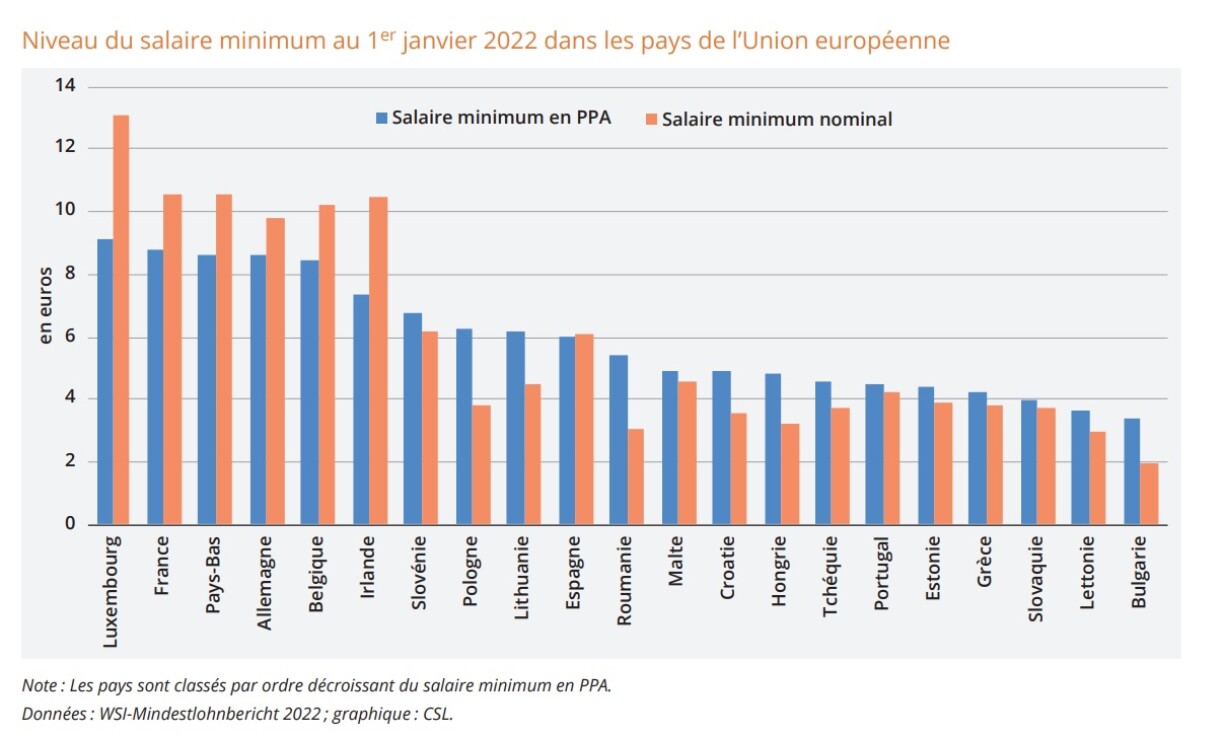
On Friday morning, Chamber of Employees president Nora Back insisted an increase in the minimum wage is required, calling for the new government to take immediate action.
Although on the face of it, the Grand Duchy’s minimum wage is higher than other European countries, it fails in its mission to “ensure a decent standard of living and adequate social protection for all workers in the country,” the Chamber of Employees’ representative explained. “The minimum wage in Luxembourg remains below the internationally-recognised thresholds to guarantee a decent living standard.”
The government re-evaluates the minimum wage every two years. As of 1 January 2023, it increased by 3.2%, and was subsequently boosted by indexations in February, April and September. The minimum social salary currently sits at €2,570.93 gross per month for unqualified workers, and €3,085.11 gross for qualified employees. However, the Chamber of Employees says that those earning less than €2,961 per month are at risk of being categorised as the ‘working poor’.

Many employees in Luxembourg are threatened by inequality despite their earnings. In March 2022, for example, an estimated 15% of employees, excluding civil servants, earned just 2% more than the minimum wage at best.
Overall, women are the worst off, with 17.2% earning the minimum social wage, compared to 13.5% of men. Despite its efforts, Luxembourg has some way to go in eradicating gender inequality. Furthermore, although fewer women work - just four out of ten employees in Luxembourg are female - they are over-represented among the proportion of employees in Luxembourg receiving both the unqualified (49.1%) and qualified minimum wage (43.1%).

Young people are also more likely to earn minimum wage. The under-30s account for 40% of staff paid the unqualified minimum wage, and 30.6% for the qualified minimum wage, despite one in five employees being under the age of 30 in Luxembourg. Single people are also more likely to earn less compared to married, partnered or divorced employees. In 2022, four out of ten female residents earning minimum wage were single. Single men accounted for more than half of minimum wage earners.
The Chamber’s analysis shows the stark reality for some foreign nationals, as the report notes that “having Portuguese nationality means a one-in-five risk of being among the lowest paid”. One in five employees earning the unskilled minimum wage in Luxembourg are Portuguese.
Likewise, manual workers are also more likely to struggle with lower-paid jobs, particularly with part-time or fixed-term contracts.
However, Luxembourgish nationals do not necessarily fare better. “Being Luxembourgish does not guarantee a high salary,” argues the Chamber, as 23% of workers earning the unqualified minimum wage are Luxembourgers. Living in Luxembourg is not a guarantee either. 59.7% of people earning the unqualified minimum wage are residents, while French cross-border workers make up 23.6.% of this workforce. A study in 2021 found that French cross-border workers earned considerably less than their Belgian and German counterparts. They make up 34.2% of employees earning the skilled minimum wage.
Although young people and women are over-represented among those earning the minimum wage, they do not reflect the typical minimum wage earner. In absolute figures, men are most likely to earn the unskilled minimum wage, with an average age of 33. They are more likely to work in commerce, and although they may have permanent contracts, they have less than nine years’ experience working in Luxembourg. When it comes to the qualified minimum wage, the demographic remains largely the same, although the average earner’s work experience rises to 11 years in Luxembourg.

Half of all minimum wage earners in Luxembourg tend to work in commerce or hospitality, with 48.7% of employees in the latter sector earning minimum wage. This represents a slightly higher share than in 2012. 30.6% of commerce staff earn minimum wage, while 37.9% of employees in the agricultural sector are low earners, although this has slightly improved over the last decade.
Although career length should generally improve an employee’s income, this is not always the case, says the Chamber of Employees. Using data from the General Inspectorate of Social Security, the CSL noted that one out of four employees paid minimum wage in 2011 was still earning minimum wage in 2021. These people will struggle during their later years when living off the minimum pension, the Chamber said, as this also falls below the poverty line.
The Chamber’s message for the future government is clear. “We hope the new coalition will pay attention to us,” says Back. “It is an important topic and the new government was elected on the basis of improving purchasing power.”